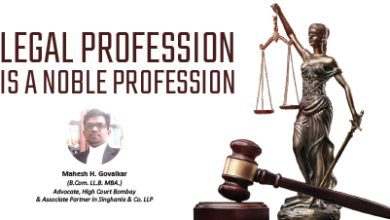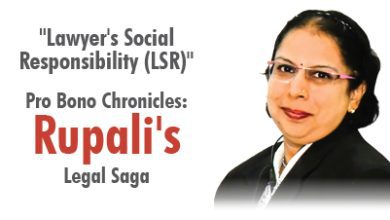COMPOUNDABLE OFFENCE AND PARTIAL QUASHING OF FIR
This Article proposes to discuss the termination T of a legal process in relation to an offence by virtue of compromise between the parties to the dispute or where an offence is causing only. private injury and no public interest is involved.

Most of the criminal law in India is contained in the Indian Penal Code, 1860 (“IPC”) and also in State enactments and special laws by the Parliament. The Code of Criminal Procedure 1973 (“Code”) is the procedural law for conducting a criminal trial in India. Most criminal cases cannot be compromised. However, some cases can be compromised and in criminal law terminology itis referred to as compounding.
The criminal cases are of three types le. warrant cases (punishment is 2 years or more), summons cases (punishment is upto 2 years) and summary cases (punishment upto 6 months). To start with, a criminal case starts before the police by lodgement of an FIR u/s 154 of the Code but it can also start with a direct complaint to the magistrate u/s 200 of the Code The case when instituted has three consequences.
(i) The case may be closed by the police if after investigation the police finds that no offence is made out in the facts alleged by an aggrieved party (the aggrieved party may challenge the report of the police).
(ii) The police may find a prima facie offence and will then place the matter before the Court with a charge sheet. The court may, upon hearing the parties as to the charge, hold that there is prima facie case and thus there is no charge framed. This is called discharge. Note that at this stage the court does not delve into guilt or innocence but as there are no grounds to proceed further basis the documents produced by the prosecution, the court records a discharge. For a commoner, this is as good as acquittal.
(III) if the Court finds that charges are made out or the Court strikes out or adds or alters the charges, then charges are framed, and the accused will be asked if he/she pleads guilty or not guilty.
The accused usually pleads not guilty and claims trial. After trial, the case will either result in a conviction or acquittal based on a finding by the Court about guilt or innocence.
Thus, we can see that a criminal case would reach conclusion in one of the above three ways l.e., police closure report subject to court’s approval, discharge by court before trial, acquittal or conviction by the court resulting in final judgement. After acquittal, the court delivers a sentence on quantum of punishment.

If the accused is not discharged or acquitted and trial proceeds, then the accused can have an option (not a vested right) to seek a compromise/compounding the case provided the complainant or the prosecution agree to the same and the offence is compoundable in nature. This can happen either in one e of following ways.
(i) Compounding u/s 320 of the Code
(ii) Quashing/partial quashing u/s 482 of the Code.
(iii) Withdrawal from prosecution u/s 321 of the Code with the leave of the Court and with permission of Central government in appropriate cases.
(iv) Plea bargaining under Chapter XXIA of the Code under the supervision of the Court and approval of the accused and victim in a crime subject to strict norms.
This Article discusses the first two i.e., compounding and quashing
Compounding
Compounding of an offence is a mechanism whereby an accused or a convict (during an appeal) may be set free of legal consequences by affording him with opportunity to strike agreement with the aggrieved person to escape punishment and the court affords its seal of approval to the same The Code sets out under Section 320 which of the offence under the IPC can be compounded. A compounding has the effect of an acquittal. There are certain offences that are compoundable if the aggrieved person accords consent whereas there are certain offences which are compoundable only with the leave of the court in addition, if a person has already been convicted and an appeal or revision is pending. then the leave of the revisional or appellate court would be necessary.
Quashing
if an offence is not compoundable, then a criminal proceeding resulting from such offence could be quashed only by the jurisdictional High Court exercising its inherent powers u/ 482 of the Code. This power by High Court is only to prevent abuse of the process of the law or to secure the ends of justice. The general rule to be understood is that whilst the compoundable offences are well defined under the Code and thus compoundable (if the complainant agrees), for settlement of disputes which are not compoundable, it is not that easy, and this is what we will discuss herein.
Partial Quashing
Partial quashing can be said to be a subset of quashing itself. Just as the High Court may quash a criminal proceeding for reasons explained above, it is possible that the High Court may quash the proceedings against one more of the accused persons when prima facie there is no case made out against them.
The power to quash a FIR partially is derived from the inherent powers of the High Court under Section 482 of the Code. But the exercise of such powers is done sparingly and only in exceptional circumstances, some of the situations where in the court may consider partially quashing an FIR are:

If the court finds out that there is no prima facie case against a particular or one of the accused in the FIR, the FIR against that particular accused may be quashed while the proceedings against the others will continue.
If the court finds out that the FIR has been filed with mala fide intentions or as a tool for harassment against an individual, the FIR may be quashed partially to protect the right and interest of the accused.
In case if the parties involved in the case have come to a settlement or compromise and are willing to withdraw the case against certain accused, the court may partially quash the FIR with respect to those accused.
In case the FIR contains allegations, which are minor or non-cognizable offences, the court may consider the quashing those specific allegations while allowing them to proceed for further serious offences.

Partial quashing can only done on the basis of a clear distinction made out of offences against accused persons. In simple terms so long as the High Court is able to distinct the offences against each accused in the process of evaluation the FIR may be partially quashed. However, the judicial precedents in this regard are not very clear as to what would /should happen if proceeding against one accused is quashed and the natural corollary to that would be that the other accused too should have been spared because same role was ascribed but the complainant agreed to settle only with one accused. In such situations the High Court may ascertain the facts and circumstances of the case and also evaluate the offence whether It is individual in nature or is it in the interest of law to allow the trial court to continue or not with the proceedings against the other accused as the matter has been settled for the offences as it is compoundable and there aren’t any other distinct offences.
In Kapil Agarwal &Ors Vs Sanjay Sharma & Others ((2021) 5 SCC 524) the Hon’ble High Court of Delhi observed that Section 482 of the Cr.P.C. Is designed to achieve the purpose of ensuring that criminal proceedings are not permitted to generate Into weapons of harassment. Hence if the complainants grievances are settled or fulfilled then in that case there is no point in going further with the litigation, in such cases the FIR can be quashed and the matter maybe dismissed but it all depends upon the facts and circumstances of the case which may vary from case to case hence a fixed condition cannot be arrived In terms of quashing of FIR for offences which are compoundable.
Hon’ble the Supreme Court in the case of B.S. Joshi v State of Haryana reported as 2003(2) R.C.R. (Criminal) 888 while relying on the judgment titled as Pepsi Foods Ltd. &Anr. v. Special Judicial Magistrate &Ors [(1998) 5 SCC 749], that this Court with reference to Bhajan Lal case observed that the guidelines laid therein as to where the court will exercise jurisdiction under Section 482 of the Code could not be inflexible or laying rigid formula to be followed by the court. Exercise of such power would depend upon the facts and circumstances of each case but with the sole purpose to prevent abuse of the process of any court or otherwise to secure the ends of justice. It is well settled that these powers have no limits. Of course,where there is more power, it becomes necessary of exercise utmost care and caution while invoking such powers.
In the matter Poonam Khanna vs State &Ors in Crl.M.C.No 3690/2016 dated 30.01.2018 the court held that partial quashing of FIR qua the accused with whom the complainant has settled or compromised the matter can be allowed and while quashing, it must be appreciated that the accused cannot be allowed to suffer based on a complaint filed by the respondent.
The Hon’ble Supreme Court in Lovely Salhotra and Anr. vs. State, NCT of Delhi (2017 SCC Online SC 636), in paragraph 4 and 7, observed and held as under: “4. We have taken into account the fact of the matter in question as it appears to us that no cognizable offence is made out against the appellant-herein. The High Court was wrong in holding that the F.I.R. cannot be quashed in part and it ought to have appreciated the fact that the appellants-herein cannot be allowed to suffer on the basis of the complaint filed by Respondent No.2 herein only on the ground that the investigation against co- accused is still pending. It is pertinent to note that the learned Magistrate has opined that no offence is made out against co-accused Nos. 2, 3, 4 and 6 prima facie.
Section 257 of the Code is noteworthy as it reads as following “Withdrawal of complaint. If a complainant, at any time before a final order is passed in any case under this Chapter, satisfies the Magistrate that there are sufficient grounds for permitting him to withdraw his complaint against the accused, or if there be more than one accused, against all or any of them, the Magistrate may permit him to withdraw the same, and shall thereupon acquit the accused against whom the complaint is so withdrawn”
Thus, a partial withdrawal of a complaint is not unbeknownst to the Code but this provision would apply to summons cases only but nonetheless recognizes the jurisprudence of partial withdrawal.
Compounding Without Approval of The Complainant
As we notice that compounding of an offence is permitted u/s 320 of the Code is only when the person aggrieved agrees to such compounding. Therefore, questions have arisen before the Courts as to instances when the Court could compound an offence even without the consent of the aggrieved person. Two noteworthy cases in this context are to be found under the Negotiable instrument Act wherein Section 147 makes all offences under this Act compoundable by reading “Notwithstanding anything contained in the Code of Criminal Procedure, 1973 (2 of 1974), every offence punishable under this Act shall be compoundable]”
In 2012, a two judge bench of Hon’ble Supreme Court a view in the matters of JIK Industries Limited vs AmarlalV. Jumani (2012) 3 SCC 255 that compounding offences under Negotiable Instruments Act and quashing of FIR or proceedings against the accused, consent/ knowledge of the complainant is sacrosanct.
However, later in 2017, another two-judge bench of the Supreme Court in M/s Meters and Instruments Pvt. Ltd. & ANR. Vs. Kanchan Mehta. [Criminal Appeal No. 1731 of 2017, (2018) 1 SCC 560] had ruled that though compounding requires consent of both parties, even in absence of such consent, in the interests of justice, on being satisfied that the complainant has been duly compensated, can in its discretion close the proceedings and discharge the accused in matters of offences made under Section 138 of Negotiable Instruments Act. The Court whilst making this observation relied on Section 147 of the Code where the words notwithstanding are used to make a departure that unlike the Code u/s 320 which mandates willingness of aggrieved party, the Section 147 does not state so.
Interestingly, the Hon’ble Supreme Court in National Insurance Company Limited v. Pranay Sethi and Ors (2017) 16 SCC 680 held that in case the subsequent bench of equal strength does not intend to follow the earlier bench of the same strength, the appropriate course would be to refer the issue to a larger bench; and that if such an approach is not taken, the judgment first in point of time, would be the binding precedent on the point of law and not the subsequent judgment. However, the Hon’ble Allahabad High Court observed (Neutral Citation No.-2023: AHC:114218 in case Criminal Revision No. 2047 of 2023) as to 2017ruling of the Supreme Court in M/s Meters (supra)that a case under Section 138 of NI Act can be discharged even without the consent of the complainant if the Court is satisfied that the complainant has been duly compensated.
Thus, the Allahabad attempted to strike a balance between the 2012 and 2017 judgment of the Supreme Court. This observation may be helpful in cases falling not just under the Negotiable Instruments Act but under section 320 of the Code as well applying the principle that complaint is appropriately compensated and no fruitful purpose would be sub served in full trial. However, the final law on this aspect is yet to be concluded but we can safely conclude that a criminal process can certainly be terminated if the offence is one that is causing mostly an injury that is private in nature and does not cause any public or national harm.

Partner
Singhania & Co.






